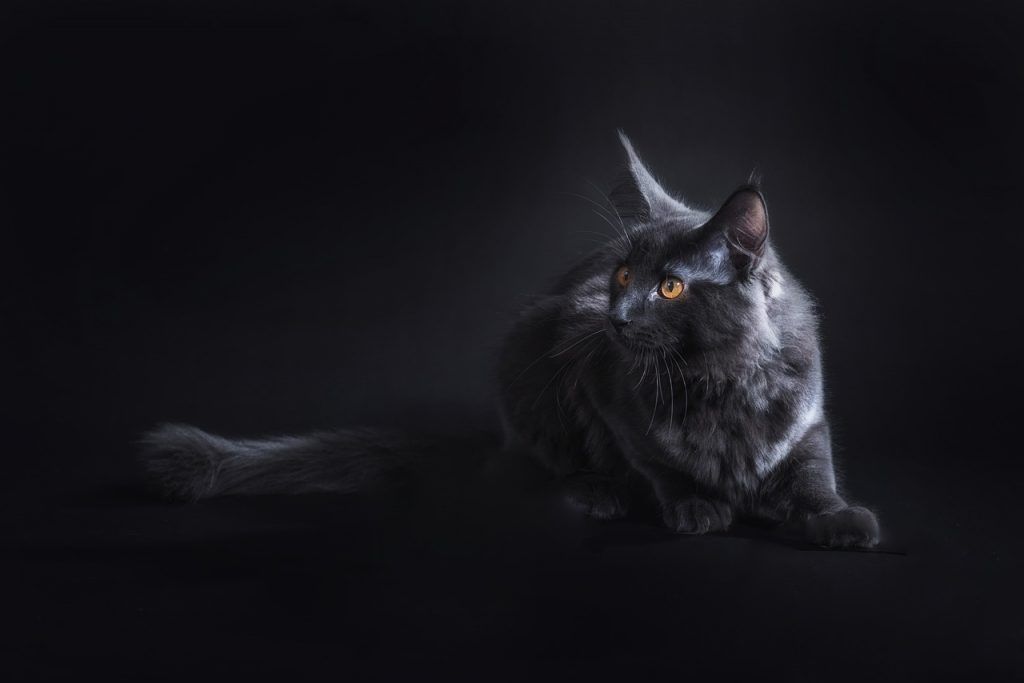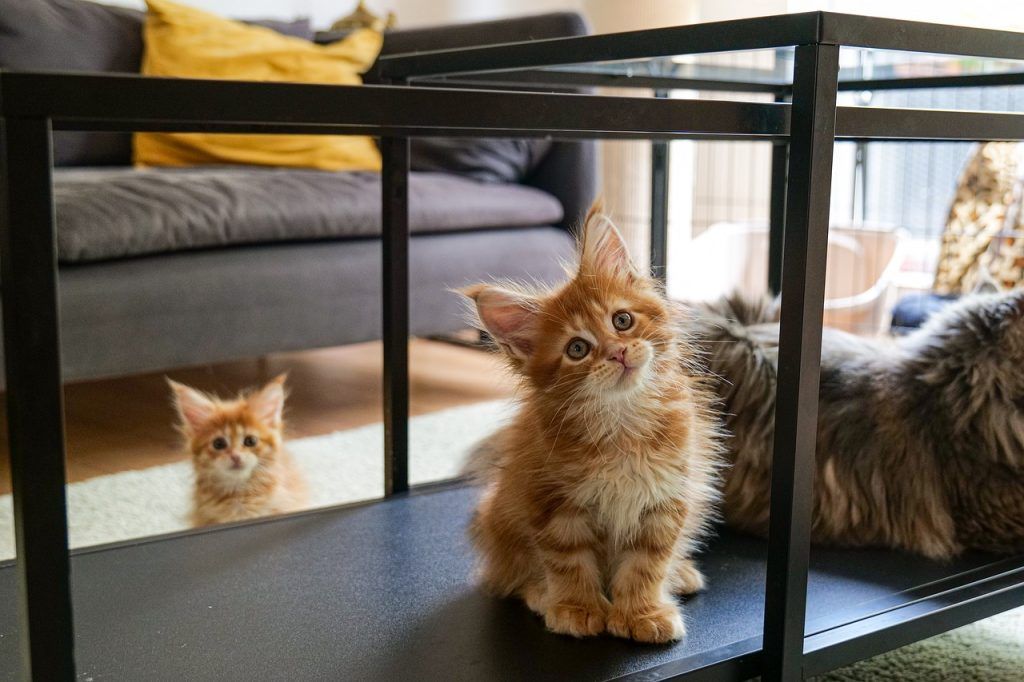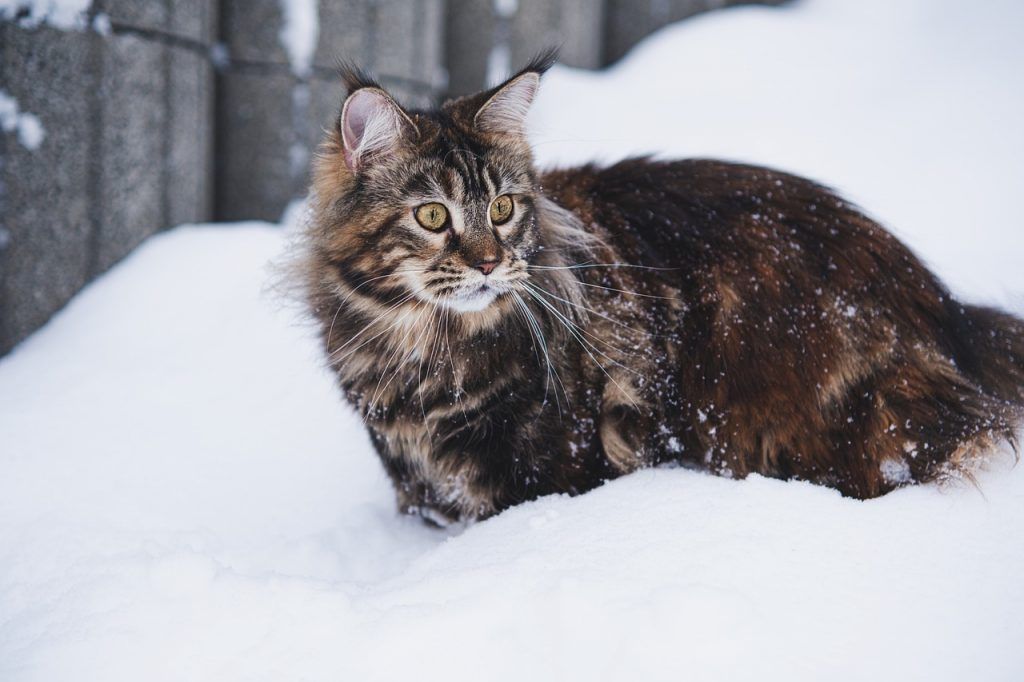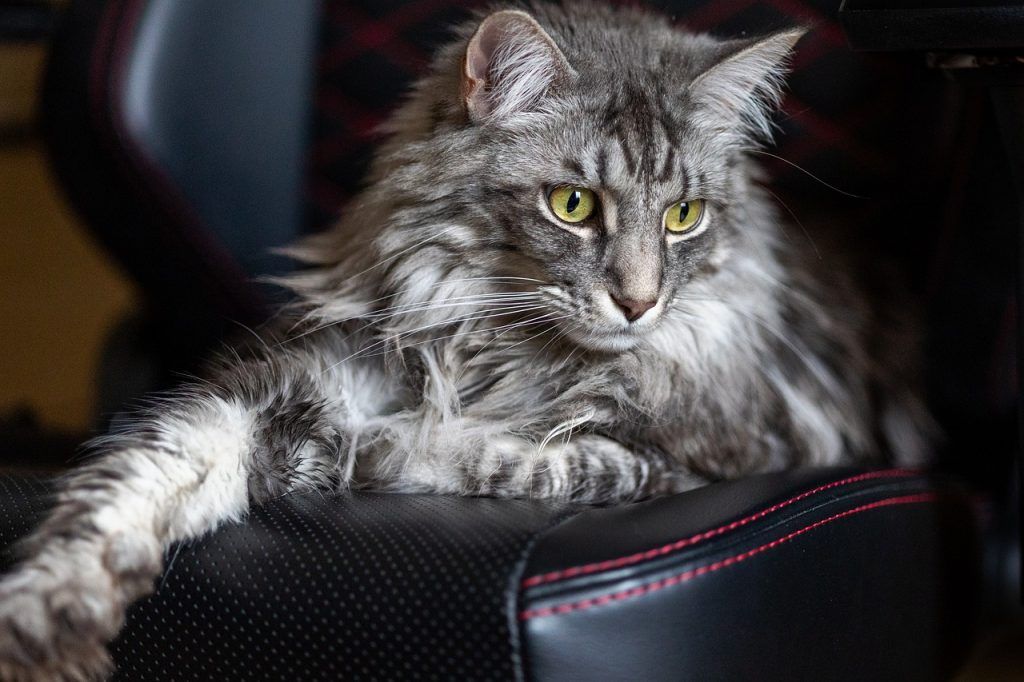The Maine Coon is one of the largest and most popular cat breeds in the world. It is also one of the oldest natural breeds in North America, originating in the state of Maine, where it is the official state cat. They are known for their distinctive physical appearance, valuable hunting skills, and friendly personalities. The breed also has a reputation of being referred to as “the gentle giant” of the cat world due to its large size and social nature.
In this article, you will learn some fascinating facts about this amazing breed, some common legends about its origin, some inherited conditions that affect its health, and some pros and cons of owning a Maine Coon.
Breed Overview
| Weight | Average of 9 to 18 pounds; males can weigh 20 pounds or more |
|---|---|
| Length | About 19 to 30 inches |
| Coat Length | Heavy and shaggy. Silky with coat falling smoothly |
| Coat Colors | Solid (white, black, blue, red and cream), tabby (classic, mackerel and ticked), bi-color (black and white, blue and white, red and white, cream and white), parti-color (tortoiseshell and blue-cream), parti-color and white (calico, tortoiseshell and white, blue-cream and white), shaded and smoke, and shaded/smoke and white |
| Coat Patterns | Various patterns depending on the coat color |
| Eye Color | Varies according to coat color, but may be green, gold, green-gold, copper, blue or odd-eyed |
| Personality | Gregarious, kind, intelligent, family-oriented |
| Lifespan | 9 to 15 years |
| Hypoallergenic | No |
| Good with Kids | Yes |
| Good with Pets | Yes |
| Origin | Maine, United States |
History of the Maine Coon Cat
The Maine Coon is one of the oldest natural breeds in North America. It originated in the state of Maine, probably in the 1850s when long-haired cats were brought to America and mated with local shorthaired cats. They developed by themselves in the harsh conditions of Maine, becoming valued for their hunting abilities and companionship by farmers and sailors.
There are various legends and myths about their ancestry, such as being sent by Marie Antoinette or being crossed with raccoons or lynxes. Still, none of them are supported by scientific evidence.
The breed was popular in cat shows in the late 19th century but faced competition from other long-haired breeds in the early 20th century. The Maine Coon has since made a comeback, becoming the third most popular pedigree cat breed in the world in 2020.

Physical appearance
The Maine Coon is a large and sociable cat that has a distinctive physical appearance and valuable hunting skills. It has several features that set it apart from other cat breeds, such as:
- Size: The Maine Coon is one of the largest domestic cats. It can weigh up to 20 pounds and measure up to 48 inches in length from nose to tail. It has a large, muscular, and heavy-boned body with a rectangular shape and a broad chest. It has a large head with a strong jawline and high cheekbones.
- Coat: The Maine Coon has a thick, shaggy coat that comes in a variety of colors and patterns. The coat helps the cat survive in harsh climates, as it is water-resistant and insulating. The coat also has a distinctive ruff around the neck, tufts on the ears and feet, and a long, bushy tail. The coat is shorter on the shoulders and longer on the stomach, britches (back legs), and tail. The coat texture is silky and falls smoothly.
- Eyes: The Maine Coon has large, expressive eyes that come in different colors depending on the coat color. The eye colors are usually gold or green, but blue and odd eyes (one blue and one gold or green) are also possible in some Maine Coons. The eyes are slightly oblique and wide-set.
- Ears: The Maine Coon has large, tall ears that are set high on the head. The ears are wide at the base and taper to a point. They have long tufts of hair at the tips, resembling those of a lynx or a bobcat. The ears are also well-furred inside to protect them from cold weather.
- Paws: The Maine Coon has large, round paws that are well-tufted between the toes. The tufts act as snowshoes, helping the cat walk on snow and ice. Some Maine Coons are polydactyl, meaning they have extra toes on each paw. This is not a defect but a natural variation that may have given them an advantage in hunting and climbing.

Fascinating Facts About Maine Coons
- The Maine Coon is one of the largest domestic cats. It can weigh up to 20 pounds and measure up to 48 inches in length from nose to tail.
- The Maine Coon has a thick, shaggy coat that comes in a variety of colors and patterns. The coat helps the cat survive in harsh climates, as it is water-resistant and insulating. The coat also has a distinctive ruff around the neck, tufts on the ears and feet, and a long, bushy tail.
- The Maine Coon has a unique vocalization that sounds like a chirp or a trill. It uses this sound to communicate with its owners and other cats. Some people say that the Maine Coon sounds like a bird or a raccoon.
- The Maine Coon is often cited as having “dog-like” characteristics. It is loyal, intelligent, playful, and trainable. It can learn to walk on a leash, fetch toys, and even open doors. It also enjoys water and may try to join you in the shower or bathtub.
- The Maine Coon has a long lifespan for a large cat. It can live up to 15 years or more with proper care and nutrition. Some Maine Coons have lived up to 20 years or more.

Common Legends About Maine Coons
There are many stories and myths about how the Maine Coon came to be. Despite the lack of truth in some of them, everyone loves a good story. Some of the most common ones are:
- One legend claims that the Maine Coon is a hybrid of a domestic cat and a raccoon. This is based on the cat’s tail and coat resemblance to that of a raccoon and its trilling sound. However, this is biologically impossible, as cats and raccoons are not closely related.
- Another legend suggests that the Maine Coon is a descendant of six Turkish Angora or Siberian cats that were brought to America by Marie Antoinette, the Queen of France, who was executed in 1793. The story goes that she tried to escape France with her cats on board a ship captained by Samuel Clough, but she did not make it. Her cats landed in Wiscasset, Maine, where they bred with local cats and developed into the Maine Coon. However, there is no historical evidence to support this story.
- A more likely story is that the Maine Coon is a result of crossbreeding between long-haired cats from Europe and short-haired cats from America in the 19th century. Some of these long-haired cats may have been Norwegian Forest Cats or Siberian Forest Cats that sailors or immigrants brought. These cats adapted to New England’s cold weather and rugged terrain and became valued for their hunting abilities and companionship by farmers and sailors.
Pros and cons
Owning one of these incredible kitties be a rewarding and enjoyable experience, but it also comes with some challenges and responsibilities. Here are some pros and cons of having a Maine Coon as a pet:
Pros
- They are friendly, loyal, intelligent, and playful. They get along well with people and other pets.
- They have a beautiful, thick coat that comes in many colors and patterns. They have distinctive features like tufted ears, feet, and tails.
- They have a unique vocalization that sounds like a chirp or a trill. They communicate with their owners and express their emotions.
- They are hardy and healthy cats that can adapt to different environments. They have a long lifespan for a large cat breed.
Cons
- They are large, active, and curious. They need a lot of space, exercise, and stimulation.
- They shed a lot and need regular grooming to prevent mats and tangles. They may also need extra care in hot weather.
- They can be noisy and demanding at times. They may be unsuitable for people who prefer quiet cats or live in apartments with thin walls.
- They are prone to certain inherited conditions that require regular screening and treatment. They may also have higher veterinary costs than smaller cats.
Common Health Issues in Maine Coons
Like any other cat breed, the Maine Coon can be prone to certain health problems that are inherited from its parents or ancestors. Some of these conditions are:
- Hip dysplasia: This is a condition where the hip joints are malformed or loose, causing pain, arthritis, and lameness. It is more common in large cat breeds like the Maine Coon. It can be diagnosed by X-rays and treated with pain medication, weight management, and surgery in severe cases.
- Spinal muscular atrophy (SMA): This genetic disease causes muscle weakness and atrophy in the hind legs. It is caused by a mutation in a gene that affects nerve cells. It can be detected by DNA testing and clinical signs. There is no cure for SMA, but it does not affect the affected cats’ lifespan or quality of life. They can live normal lives with some support and care.
- Hypertrophic cardiomyopathy (HCM): This is a heart disease that causes the walls of the heart to thicken, reducing its ability to pump blood effectively. It can lead to heart failure and sudden death. It is the most common form of heart disease in cats and can affect any breed, but Maine Coons are more prone to it due to a genetic mutation. It can be diagnosed by an echocardiogram (heart ultrasound) and treated with medication and dietary changes.
- Polycystic kidney disease (PKD): This kidney disease causes fluid-filled cysts to form in the kidneys, impairing their function and leading to kidney failure. It is caused by a genetic mutation that can be detected by DNA testing or ultrasound. There is no cure for PKD, but it can be managed with medication, diet, and fluid therapy.
Other health concerns that may affect Maine Coons include periodontal disease, obesity, patellar luxation (dislocated kneecap), and ear infections.
Where to Buy a Maine Coon
If you are interested in buying a Maine Coon cat, you have several options to choose from. You can adopt one from a shelter or rescue group or buy one from a reputable breeder. However, each option has advantages and disadvantages, and you should be careful and research before making a decision.
Adoption
Adopting a Maine Coon cat from a shelter or rescue group can be a great way to save a life and give a home to a cat in need. You may also save some money, as the adoption fee usually ranges from $100 to $400 and includes some basic veterinary care such as vaccinations and spaying/neutering.
However, finding a purebred Maine Coon cat for adoption may not be easy, as they are not very common in shelters. You may have to wait for a long time or travel to a different location to find one. You may also not know much about the cat’s background, health history, or personality.
Breeder
Buying a Maine Coon cat from a reputable breeder can be a good option if you want a healthy, well-socialized, and pedigreed kitten. A good breeder will screen their breeding cats for genetic health issues, provide you with health certificates and guarantees, and offer you support and advice throughout the cat’s life.
However, buying a Maine Coon cat from a breeder can also be very expensive, as the average price for a purebred kitten ranges from $800 to $2000. This can go up to $2500 or more for rarer or superior pedigrees. You may also have to wait for several months or even years to get a kitten from a reputable breeder, as they usually have long waiting lists.
Suppose you decide to buy a kitten from a breeder. Do your research and find a responsible and ethical breeder registered with major cat associations such as TICA (The International Cat Association) or CFA (The Cat Fanciers’ Association). If possible, visit the breeder’s premises and meet the parents and kittens in person before making a purchase.

Conclusion
The Maine Coon is an amazing cat breed that has many fans around the world. If you are looking for a large, fluffy, friendly, and fun-loving cat, you may want to consider adopting a Maine Coon.
I hope this article has given you some useful information about the Maine Coon cat breed. If you have any questions or comments, feel free to leave them below. Thank you for reading!
More Cat Breeds
If you’re interested in learning about similar cat breeds, check out:
FAQ
How much are Maine Coon cats?
The cost of a Maine Coon cat depends on where you get it from and what quality and pedigree it has. Generally, you can expect to pay between $400 and $2000 for a purebred Maine Coon kitten from a breeder. Adopting one from a shelter or rescue group may cost less, but finding one may be harder.
What is the temperament of a Maine Coon?
Maine Coons are known for their friendly, gentle, and intelligent personalities. They are very social and enjoy being around people and other animals. They are also playful, curious, and loyal and often have a dog-like demeanor.
How big do Maine Coon cats get?
Maine Coons are one of the largest domestic cat breeds. They can weigh up to 20 pounds and measure up to 48 inches in length from nose to tail. They have large, muscular, and heavy-boned bodies, with rectangular shapes and broad chests.
How long do Maine Coon cats live?
Maine Coons have a lifespan of 9 to 15 years on average. However, some may live longer or shorter depending on their health, diet, and care. Some common health issues that may affect Maine Coons are hip dysplasia, spinal muscular atrophy, hypertrophic cardiomyopathy, and polycystic kidney disease.
Are Maine Coons hypoallergenic?
No, Maine Coons are not hypoallergenic. They have a thick, shaggy coat that sheds a lot and may trigger allergies in some people. They also produce dander and saliva that contain allergens. If you are allergic to cats, you may want to avoid Maine Coons or consult your doctor before getting one.
























